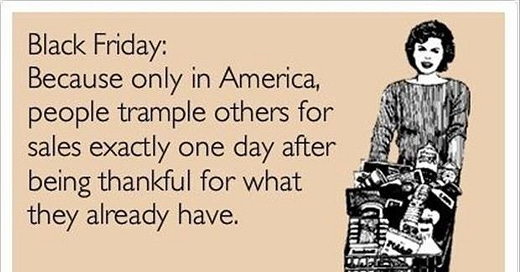The Most Schizophrenic 48 Hours of the American Existence
In case you were unaware, today - Thanksgiving - is the first of two days (the second being Black Friday) that make up the most schizophrenic 48 hours of the American existence. As the meme reminds, only in America do people trample others for sales exactly one day after being thankful for what they already have.
If only we cared.
Last night, to celebrate her birthday, I took Megan out for dinner, and then we went to Best Buy to replace a phone charger for our van (I'm the king of disguising errand purchases as birthday presents; for example, earlier in the day, I bought Megan two gallons of birthday milk). As we walked in, we noticed three camping tents set up to the left of the doors - people camping out in order to be first in line when the big box store's doors open early on Friday.
Some stores are not even waiting until Friday morning to open; 6 p.m. tonight (or 5 p.m. if you go to Dick's Sporting Goods) is when the doors will open at some stores. For many, this may seem simply convenient (or even aerobic - "Let's load up the car and go walk the turkey calories off, kids! Oh, and by the way, we might get some deals!"), but the fact is we're about to lose Thanksgiving as our last non-commercial holiday, and that alone is worthy of one more blog post lamenting this reality.
John M. Grondelski (Ph.D., Fordham), former associate dean of the School of Theology at Seton Hall, makes the point in his own post this morning at Crisis Magazine:
"America, as any community, requires traditions and celebration to bind it together. Our social glue is becoming increasingly thin. Most of our federal holidays have been increasingly hollowed out of cultural activity and replaced by commercial activity. Presidents Day and Columbus Day are primarily known for sales. Memorial Day launches the summer—and summer sales—while Labor Day closes it, just in time for Back-to-School Sales. Martin Luther King’s Birthday still has to catch on as a broadly celebrated holiday. Christmas and, to a lesser extent, New Year’s, continue to be observed, the former often in pseudonymous fashion as 'Winter Holiday,' the latter still not fully displaced by those who would criticize January 1 as representing but one culture’s start of the year. The only two national holidays that continue to be observed in a primarily historical/cultural fashion—as opposed to being the next sales opportunity—are the Fourth of July and Thanksgiving. These two quintessentially American holidays have largely managed to stay aloof from bald commercialization on the day itself, remaining family days. They are under assault."
The cultural aspect of all this is one thing, and as patriotic as some folks may consider themselves, few have given much thought (or care) to what Grondelski describes; it is, so the slogan goes, a free country, and if people want to spend their way through whatever holiday they happen to be celebrating, well, praise the Lord and pass the ammunition.
Sadly, the American Christian perspective involves little variance, though it tends to take on different justifications: "We're thrifty and we save a lot of money shopping on Black Friday." "It's just what we've always done every year." "It gets everybody out of the house and off each others' nerves."
Cheap pragmatism, thoughtless habit, relational convenience. Sounds an awful lot like the American Church.
Black Friday shopping is not the problem, of course, but the symptom. At the end of the day, when the news outlets run their annual piece on how important Black Friday is to the American economy (interspersed by B-roll of whatever cash register smackdown took place in the big box stores), I would for once just love to hear a reporter name our affliction for what it is: greed. After all, if we're going to be so noble as to do our part to support American capitalism, let's at least be honest enough to acknowledge what American capitalism is built upon.
What's an antidote to this symptom of sickness? If only we feared greed like we do Ebola, a quarantine/boycott wouldn't even be a question. But again, that just deals with the outer infection; how do we deal with the epidemic at its source?
"Gratitude," said Cicero, " is not only the greatest of the virtues but the parent of all others." Centuries later, G.K. Chesteron wrote, "I would maintain that thanks are the highest form of thought; and that gratitude is happiness doubled by wonder.”
In a culture that preaches and preys on entitlement fantasies (increasingly during its holidays, but always throughout the year), there is no more important virtue than gratitude to pray for in our children and in ourselves. Forget the cliche "attitude of gratitude" triteness; think more desperately and for the sake of humanity, for if Cicero is right (and Chesterton seems to think he is), without gratitude, there can be nothing else - no faith, no hope, no love.
No matter how long you camp out at Best Buy, virtues never go on sale.
If we're not careful, they might just go away.




